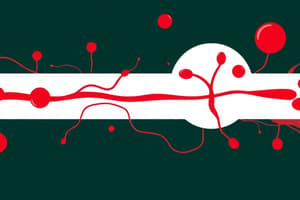Podcast
Questions and Answers
What is blood composed of?
What is blood composed of?
Plasma (55%) and cellular elements (45%)
What is the average volume of blood in women?
What is the average volume of blood in women?
5 liters
What is the specific gravity of plasma?
What is the specific gravity of plasma?
1.030
Which function of blood involves transporting oxygen and carbon dioxide?
Which function of blood involves transporting oxygen and carbon dioxide?
What percentage of blood volume does plasma represent?
What percentage of blood volume does plasma represent?
Plasma has a higher viscosity than water.
Plasma has a higher viscosity than water.
Plasma comprises _____% of blood volume.
Plasma comprises _____% of blood volume.
What role does water play in plasma composition?
What role does water play in plasma composition?
What are the primary types of plasma proteins?
What are the primary types of plasma proteins?
Where are plasma proteins synthesized?
Where are plasma proteins synthesized?
Serum contains fibrinogen and clotting factors.
Serum contains fibrinogen and clotting factors.
Flashcards are hidden until you start studying
Study Notes
Blood Properties
- Blood is a red fluid within blood vessels, representing 8% of body weight (5 liters in women, 5.5 liters in men).
- Specific gravity: 1.060 for whole blood, 1.030 for plasma, 1.090 for blood cells.
- Viscosity: 5 times that of water for whole blood, 2 times for plasma.
Blood Components
- Plasma: The fluid portion, comprising 55% of blood volume.
- Cellular Elements: Comprising 45% of blood volume:
- Red Blood Cells (RBCs): Erythrocytes.
- White Blood Cells (WBCs): Leukocytes.
- Platelets: Thrombocytes.
Blood Functions
- Transport:
- Carries oxygen to tissues and carbon dioxide to the lungs.
- Transports absorbed nutrients from the gut.
- Transports waste products for excretion (e.g., urea, uric acid).
- Transports hormones and regulatory substances.
- Temperature Regulation: Plasma absorbs and distributes heat produced by metabolism.
- Hemostasis: Blood clots to stop bleeding and seal injuries.
- Defense:
- White blood cells attack invading organisms.
- Antibodies provide immune defense.
- Nutrition:
- Provides nutrients for tissues (sugars, amino acids, fatty acids, minerals).
- Plasma proteins can be broken down for extra amino acids.
Plasma Properties
- Fluid portion of blood, comprising 3.5 liters in a 70 kg man (5% of body weight).
- Yellow color.
- Specific gravity: 1.030.
- pH: 7.4.
- Viscosity: 2 times that of water.
- Osmotic pressure:
- Crystalloid: 5000 mmHg.
- Colloid (proteins): 25 mmHg.
Plasma Composition
- Water: 90%, medium for transport and temperature regulation.
- Plasma Proteins: 6-8% of total weight.
- Inorganic Constituents: 1% of total weight (Na+, Cl-, HCO3-, K+, Ca2+, Mg+).
- Other: Nutrients, waste products, dissolved gases, hormones.
What is Serum?
- Fluid remaining after blood clots and the clot is removed.
- Same composition as plasma but lacks fibrinogen and clotting factors II, V, and VIII.
Plasma Proteins:
- Important components that remain in the plasma and perform various functions.
- Do not pass through capillary pores due to their size.
- Exist in a colloidal dispersion.
- Total concentration: 6-8 g/dl.
- Three groups:
- Albumin: 4-4.5 g/dl.
- Globulin: 2.5 g/dl (subdivided into α1, α2, β1, β2, and γ globulins).
- Fibrinogen: 0.3 g/dl.
- Albumin/Globulin (A/G) ratio: 1.2-1.6.
Site of Synthesis of Plasma Proteins
- Most are synthesized by the liver.
- γ-globulins are produced by lymphocytes.
Studying That Suits You
Use AI to generate personalized quizzes and flashcards to suit your learning preferences.




